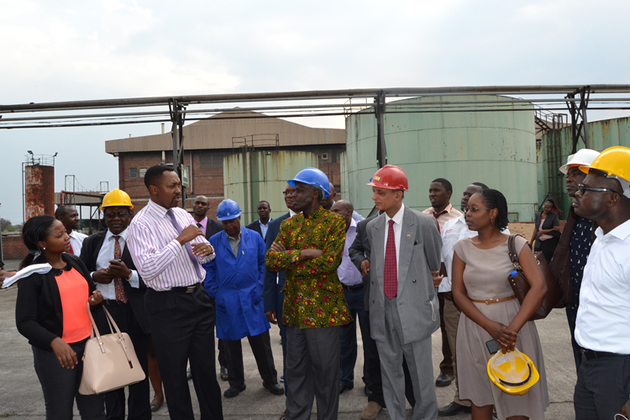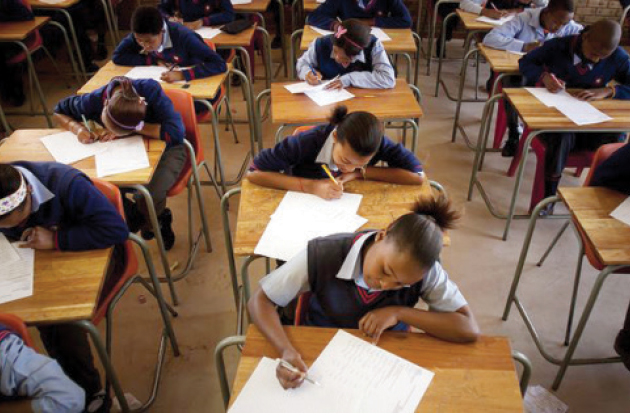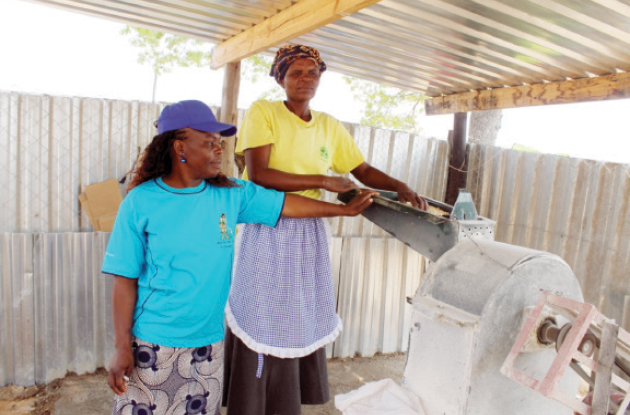United Refineries contracts 166 soya bean farmers


United Refineries CEO Busisa Moyo briefs a delegation from the office of the President, officials from the African Development Bank, African Export-Import Bank (Afrexim Bank) and embassy officials from different countries during a tour of companies in Bulawayo last week
Oliver Kazunga Senior Business Reporter
UNITED Refineries Limited (URL) has contracted about 160 soya bean farmers as the firm seeks to boost the supply of the raw material. The giant Bulawayo-based agro-processing concern also manufactures laundry and bath soap.
URL chief executive officer Busisa Moyo said his company requires about 30,000 hectares of soya beans to operate at full throttle.
“We’ve engaged 166 farmers to do soya beans growing. The company also needs close to 30,000 hectares of soya under irrigation at a yield of two tonnes per ha,” he said while briefing a delegation from the Office of the President and Cabinet during a tour of companies in Bulawayo last Wednesday.
Last year, the agro-processing firm availed $2 million for contract farming with farmers in Umguza and Jotsholo.
The company mainly receives its supply of the raw material from Chinhoyi.
Due to the distance between the firm’s factory and the source of the raw material, Moyo said the company was incurring high production costs.
URL needs 96,000 tonnes of oil seed per annum but is only able to access 50 percent of that locally.
“We’re not able to get sufficient oil seed locally so we’re importing crude oil which we use to produce laundry and tablet (bath) soaps. We’re also producing stock feed which comes as a by-product,” said Moyo.
The agro-processor is at the moment operating at 65 percent and 77 percent capacity utilisation for the soap-making and cooking oil divisions respectively.
Moyo, who is also the Confederation of Zimbabwe Industries (CZI) president, said one of the major constraints impacting on the operations of companies was limited access to funding.
“One of the challenges facing companies is funding. As CZI, we’re working to organise at next year’s Zimbabwe International Trade Fair, meetings with financial institutions and companies that offer original markets so that we boost capacity in the local manufacturing sector. We’ll meet during the trade fair next year with banks to see how best they can price their money correctly. The issue of tenure on funding is also a challenge when it comes to lending. We need to look at how we configure the financing of the equipment.
“Our financial services sector isn’t vibrant and relevant for the current situation . . . at 18 percent interest rates per annum, you’re incentivising the person doing merchantile activities because they don’t manufacture,” he said.
The Reserve Bank of Zimbabwe is on record as saying lending rates by local institutions should go to levels between six and eight percent per annum.
However, because monetary authorities were not performing the lender of last resort function, they can only encourage the local financial services sector to reduce interest rates through moral persuasion.











Comments